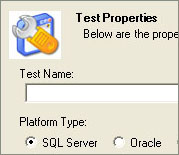AMD's dual core Opteron & Athlon 64 X2 - Server/Desktop Performance Preview
by Anand Lal Shimpi, Jason Clark & Ross Whitehead on April 21, 2005 9:25 AM EST- Posted in
- CPUs
SQL Stress Tool Benchmark
Our first benchmark was custom-written in .NET, using ADO.NET to connect to the database. The AnandTech Forums database, which is over 14GB in size at the time of the benchmark, was used as the source database. We'll dub this benchmark tool "SQL Stress Tool" for the purposes of discussing what it does. We have done some updates to the tool since we first used it; it now supports Oracle, and MySQL. We also adjusted the test time for this test and future tests to 20 minutes. The reason for this was to ensure that we used as much memory as possible for future planned 64 bit tests.SQL Stress allows us to specify the following: an XML based workload file for the test, how long the test should run, and how many threads it should use in which to load the database. The XML workload file contains queries that we want executed against the database, and some random ID generator queries that populate a memory resident array with ID's to be used in conjunction with our workload queries. The purpose of using random ID's is to keep the test as real-world as possible by selecting random data. This test should give us a lot of room for growth, as the workload can be whatever we want in future tests.
Example workload:
Example Random ID Generator:
The workload used for the test was based on every day use of the Forums, which are running FuseTalk. We took the most popular queries and put them in the workload. Functions, such as reading threads and messages, getting user information, inserting threads and messages, and reading private messages, were in the spotlight. Each reiteration of the test was run for 20 minutes, with the first being from a cold boot. SQL was restarted in-between each test that was run consecutively.
The importance of this test is that it is as real world as you can get; for us, the performance in this test directly influences what upgrade decisions we make for our own IT infrastructure.











144 Comments
View All Comments
ceefka - Thursday, April 21, 2005 - link
So, would an nForce 3 250 board work with an A64 X2?smn198 - Thursday, April 21, 2005 - link
#4 "I find it strange why AMD did not release <2.2GHz A64 X2s? Maybe due to manufacturing issues?"When you make a dual core CPU, a defect on one of them makes the whole lot worthless. I believe that to try and reduce this, they can increase yield by producing lower clocked parts
L3p3rM355i4h - Thursday, April 21, 2005 - link
#9 you're dreamin' Theres no way that AMD can sell a 1.8ghz chip for sub-$200 when a frickin' venice is retailing for $179. A 1.8ghz chip would be upper $300 to lower $400s.But, damn the "X2" performs nicely. Just think, with a stable, higher performing motherboard with decent timings how much better it would get.
Shinei - Thursday, April 21, 2005 - link
Nice, dual-core. AMD's going to be hurt badly by the lack of volume on their X2 units, though, considering that Intel's got the money to post minor losses on each chip sold just to regain their marketshare. I'm surprised AMD hasn't tapped IBM to give them one or two 65nm fabs to prepare for the A64X2 launch later this year...AnnihilatorX - Thursday, April 21, 2005 - link
hm hope fab36 would increaswe production capacity of AMD and lower the cost down a bitblckgrffn - Thursday, April 21, 2005 - link
Awesome...I wish we could have seen a 4 socket 8 processor system rocking out with those four way xeons though, that would really illustrates some differences ;)I agree with the previous sentiment on the x2's, I hope they bring out a sub $200 1.8 ghz or so model. I will be sticking this in my desktop box, not my gaming box, so if they can't bring anything out under $200 I will probably have to go with Intel. Boo for that ;)
Nat
Zebo - Thursday, April 21, 2005 - link
It's a wonderful article Anand, always love yours.. very in-depth But you're forgetting mem timings??? Arr.:)Zebo - Thursday, April 21, 2005 - link
Slobber:Pblackbrrd - Thursday, April 21, 2005 - link
#4 AMD probably wants you to buy their single core cpus instead, as they are much cheaper to produce and easier to produce in quantities. AMD would probably have problems delievering a lower cost dual core in quantities .Who doesn't drewl for a A64 X2 after seeing this review??? I certainly do.
The dual core intel wouldn't be so bad either, except for the amount of heat it produces off.
filterxg - Thursday, April 21, 2005 - link
Nice article. AMD has obviously awoken a sleeping giant, and Intel is fighting back on the pricing front. Hopefully the gamble that AMD single cores can hold their own versus Intel Duallies is true on the mid-low end (at least for the near future). I won't be buying an Intel chip anytime soon (unless I need a laptop).Either way I figure I got 2.5 years before I need a dualcore, and by then who knows. So bravo to both companies for this innovation.